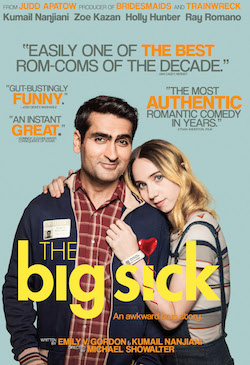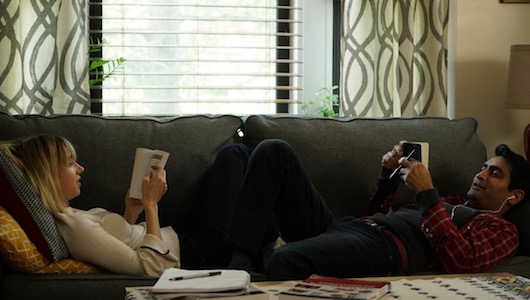 FILM
FILM In Which We Feel Ill Yet Considerably More Appealing Than Usual
 Thursday, July 27, 2017 at 9:00AM
Thursday, July 27, 2017 at 9:00AM 
Completely Organic
by ELEANOR MORROW
The Big Sick
dir. Michael Showalter
124 minutes
 At one point, Kumail Nanjiani makes a short speech detailing what he likes about the woman named Emily (Zoe Kazan) he picked up at a comedy club in The Big Sick. (He does not mention that he liked that she was sick, but it is implied.) The things he primarily mentions are that she is in fact a woman, and that she is very fond of birds. When he finds out that she has an infection in her lungs, he has no reaction to it until he sees a graphic tee in her closet and remembers her wearing it. You see, a woman's personality is probably mainly a function of whatever clothing she donned at the time you chose her as your wife.
At one point, Kumail Nanjiani makes a short speech detailing what he likes about the woman named Emily (Zoe Kazan) he picked up at a comedy club in The Big Sick. (He does not mention that he liked that she was sick, but it is implied.) The things he primarily mentions are that she is in fact a woman, and that she is very fond of birds. When he finds out that she has an infection in her lungs, he has no reaction to it until he sees a graphic tee in her closet and remembers her wearing it. You see, a woman's personality is probably mainly a function of whatever clothing she donned at the time you chose her as your wife.
In other scenes, Kumail is made very upset by a series of Muslim women forced upon him by his mother (Zenobia Shroff). They are all quite lovely people and one even does an amazing magic trick; he never takes the time to get to know any of them. American culture, we may infer, has trained him to select a partner as alike to Zooey Deschanel as one can possibly manage.

In real life, Emily V. Gordon clearly has some talent outside of her passion for water fowl. She hosts a podcast for Christ's sake – do you think Saint Peter would dare look askance at her at the pearly gates? We never learn about that part of Emily except what the alarmingly engaging Zoe Kazan implies non-verbally. Instead we know only that she is a psychology student with very little grasp of basic human psychology. When Emily is placed in a medically induced coma during The Big Sick, part of us is greatly relieved, because watching two people have nothing in common except Whole Foods is not the most thrilling use of two hours.

The Big Sick picks up when Emily's mother Beth (Holly Hunter) and her father Terry (Ray Romano) come on the scene. It is suggested that Beth comes from a deeply anti-Semitic North Carolina family, and that Terry's ability to ignore their various taunts is what endeared him to her. Because Terry recently cheated on her during a work conference, she is very critical of him during The Big Sick. When he tries to tell a joke, she immediately puts down his sense of humor, and she frequently heckles him by shouting "Terry!" but since she is Holly Hunter, I don't think he minded.
Kumail does not have much in the way of an inner life, but he knows he must bond with his girl's mother so that she will forgive him for telling her he wasn't sure they had a future together, which is apparently the most nightmarish thing one person can say to another. His plan is to eat with Beth, and he even sucks down whipped cream from a can. This is bonding across racial lines, I guess, but The Big Sick doesn't try to force any kind of mutual understanding. In Chicago, everyone relates to everyone else on what is basically a surface level.

Some things that Emily and Kumail enjoy doing together are reading. They make out on a couch, and sometimes have sex. Once, one of them takes a shit while the other waits patiently. This is apparently true compatibility? I really don't know, I guess whatever works, but it seems like these two are going to encounter some serious problems down the road given that the euphoria inherent in taking drugs and watching movies with someone else generally wears off by the end of an evening.

I don't know that there was ever really enough in this meet-cute to account for a feature length film. But it is Kumail Nanjiani who carries the entire thing on his shoulders. As he seems to realize, his stand-up comedy is not terribly funny, and The Big Sick makes his true calling abundantly clear – he is an actor, with a natural ability to deliver all kinds of lines in a spare and convincing manner. While Zoe Kazan gamely struggles with the various awkward speeches she has to make at times, Nanjiani takes them at his own pace, showing how explaining and articulating yourself, no matter what the substance of your talk is, remains a moral act.
Eleanor Morrow is the senior contributor to This Recording.










































